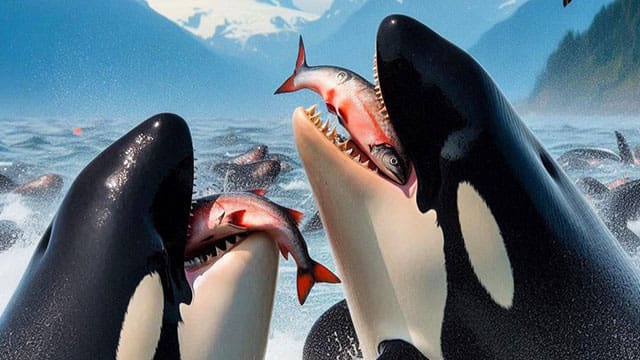We’re sacrificing salmon, jobs and livelihoods to save a doomed whale species
 Gazing out at the beautiful ocean in front of our Vancouver Island home is a daily reminder that my wife and I are truly blessed. In spring, the waters darken with thousands of herring. Eagles swoop down to snatch herring to feed to their hungry nestlings. Great Blue Herons stand fishing near the shores while seals swim from nearby rocks to feast on nature’s abundance.
Gazing out at the beautiful ocean in front of our Vancouver Island home is a daily reminder that my wife and I are truly blessed. In spring, the waters darken with thousands of herring. Eagles swoop down to snatch herring to feed to their hungry nestlings. Great Blue Herons stand fishing near the shores while seals swim from nearby rocks to feast on nature’s abundance.
If we happen to be looking out at just the right time, Orcas (a.k.a. killer whales) rise from the depths with mouths wide open, devouring the seals. But these are not the “southern resident” whales that many believe are the last Orcas on the planet. Rather, they are some of the estimated 400 Biggs killer whales that roam B.C.’s coastal waters feeding on the sea lions and seals that are all too plentiful here.
The 400 are part of an estimated population of 50,000 Orcas in the world’s oceans, which makes them, next to humans, the most widely distributed mammal on the planet. That may surprise any Vancouver Islanders who have been led to believe the “southern resident killer whales” are the only 74 Orcas left on the planet.
 |
| Related Stories |
| Ottawa’s open-net ban an economic disaster for Indigenous communities
|
| 60,000 salmon fry released to restore B.C. populations
|
| GMO salmon means there are now bigger fish to fry
|
They aren’t. On the other hand, they are the only Orcas in the world that eat only salmon. This has spawned a frenetic “save the salmon for the whales” campaign, leading to fishery closures that have severely impacted B.C.’s crucial recreational sport fishing industry. Guide boats are left idle at the docks, tackle shops are going out of business, and thousands of hotel rooms and lodges are sitting empty.
Closures this year include the prolific Swiftsure Bank, on which the entire town of Port Renfrew depends (and where, incidentally, my grandson caught his first salmon). The salmon fishery in all the Southern Gulf Islands is also closed to, in the words of federal Fisheries Minister Joyce Murray, “protect these remarkable marine mammals (the Orcas) and preserve their cultural and ecological significance.” But the only thing that is remarkable about them is that they are the only 74 Orcas out of 50,000 in the world that are addicted to salmon.
Eighteenth-century naturalist Charles Darwin’s law of natural selection says, “Inherited variations determine a species’ ability to survive.” A clear illustration of Darwin’s law is contained in a peer-reviewed paper reported on in the August 4 Victoria Times Colonist. It concluded: “the southern resident whales are on a path toward … accelerating decline that presages extinction.”
Meanwhile, the futile attempt to save those 74 whales doomed by the law of natural selection is devastating a vital part of our West Coast economy. By contrast and on the upside of natural selection, the 400 thriving Biggs killer whales are eating the seals and sea lions that are devouring our salmon.
When it comes to the West Coast marine economy, if it’s not about salmon fishing, it’s still about salmon. The recent federal decision to offer only five-year renewals to open-net salmon farms set a 2029 shutdown date for an industry that has operated safely for four decades. Environmental activists have long claimed that the farms spread sea lice that harm wild salmon, but they have been unable to produce credible scientific evidence supporting their claims.
There is credible scientific evidence to the contrary, however. A 2023 Fisheries and Oceans Canada report found no “statistically significant association” between sea lice infestations … and the fish farms (the wild salmon) migrate past along the B.C. coast.” This renders the government’s decision totally inexplicable.
No wonder Canadian Aquaculture Industry Alliance chief executive Tim Kennedy reacted to it as follows: “The objective is unreasonable because there is no scientific basis to the decision. The objective is irresponsible because it threatens 5,000 skilled jobs.” The federal decision to cave to activists who don’t have a credible scientific basis for their claims about salmon farming is both morally wrong and economically destructive.
But the Alliance statement includes an even more troubling fact that, paradoxically, does put wild salmon in severe peril: 95 percent of Canada’s salmon production comes from open-net salmon farms. Imagine how the price of the remaining five percent will skyrocket when that production stops. The government can try to keep the fishing of wild salmon at regulated levels, but good luck with that: it will take a virtual armada to stop the poachers.
Between the poachers and the salmon-addicted Orcas, those wonderful salmon dinners would be affordable only to the wealthy. The sport fishery would be doomed.
Good thing my grandson caught his salmon while he could.
Gwyn Morgan is a retired business leader who has been a director of five global corporations.
For interview requests, click here.
The opinions expressed by our columnists and contributors are theirs alone and do not inherently or expressly reflect the views of our publication.
© Troy Media
Troy Media is an editorial content provider to media outlets and its own hosted community news outlets across Canada.

